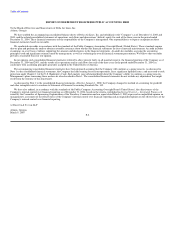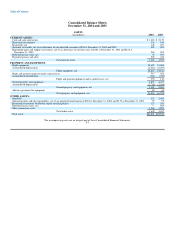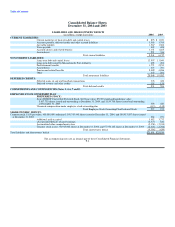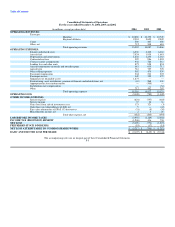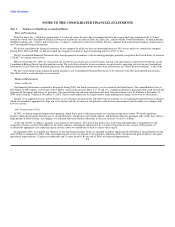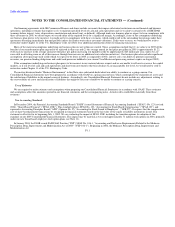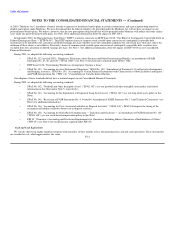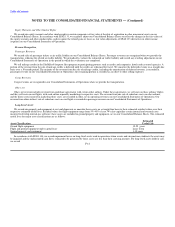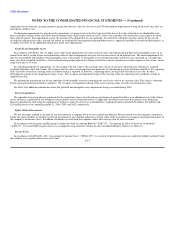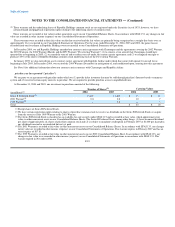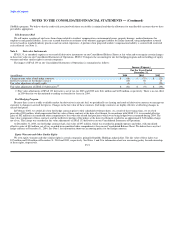Delta Airlines 2004 Annual Report Download - page 68
Download and view the complete annual report
Please find page 68 of the 2004 Delta Airlines annual report below. You can navigate through the pages in the report by either clicking on the pages listed below, or by using the keyword search tool below to find specific information within the annual report.
Table of Contents
NOTES TO THE CONSOLIDATED FINANCIAL STATEMENTS — (Continued)
Our financing agreements with GE Commercial Finance and Amex include covenants that impose substantial restrictions on our financial and business
operations, including covenants that require us (1) to maintain specified levels of cash and cash equivalents and (2) to achieve certain levels of EBITDAR
(earnings before interest, taxes, depreciation, amortization and aircraft rent, as defined). Although under our business plan we expect to be in compliance with
these covenants in 2005, we do not expect to exceed either of the required levels by a significant margin. Accordingly, if any of the assumptions underlying
our business plan proves to be incorrect, we might not be in compliance with these covenants, which could result in the outstanding borrowings under these
agreements becoming immediately due and payable (unless the lenders waive these covenant violations). If this were to occur, we would need to seek to
restructure under Chapter 11 of the U.S. Bankruptcy Code. See Note 6 for additional information about our financing transactions.
Many of the material assumptions underlying our business plan are not within our control. These assumptions include that (1) we achieve in 2005 all the
benefits of our transformation plan targeted to be achieved in that year and (2) the average annual jet fuel price per gallon in 2005 is approximately $1.22
(with each 1¢ increase in the average annual jet fuel price per gallon increasing our liquidity needs by approximately $25 million per year, unless we are
successful in offsetting some or all of this increase through fare increases or additional cost reduction initiatives). Our business plan also includes significant
assumptions about passenger mile yield (which we expect to be lower in 2005 as compared to 2004), interest rates, our ability to generate incremental
revenues, our pension funding obligations and credit card processor holdbacks (our current Visa/Mastercard processing contract expires in August 2005).
If the assumptions underlying our business plan prove to be incorrect in any material adverse respect and we are unable to sell assets or access the capital
markets, or if our level of cash and cash equivalents and short-term investments otherwise declines to an unacceptably low level, we would need to seek to
restructure under Chapter 11 of the U.S. Bankruptcy Code.
The matters discussed under "Business Environment" in this Note raise substantial doubt about our ability to continue as a going concern. Our
Consolidated Financial Statements have been prepared in accordance with GAAP on a going concern basis, which contemplates the realization of assets and
the satisfaction of liabilities in the normal course of business. Accordingly, our Consolidated Financial Statements do not include any adjustments relating to
the recoverability of assets and classification of liabilities that might be necessary should we be unable to continue as a going concern.
Use of Estimates
We are required to make estimates and assumptions when preparing our Consolidated Financial Statements in accordance with GAAP. These estimates
and assumptions affect the amounts reported in our financial statements and the accompanying notes. Actual results could differ materially from those
estimates.
New Accounting Standards
In December 2004, the Financial Accounting Standards Board ("FASB") issued Statement of Financial Accounting Standards ("SFAS") No. 123 (revised
2004), "Share-Based Payment" ("SFAS 123R"). This standard replaces SFAS No. 123, "Accounting for Stock-Based Compensation" ("SFAS 123") and
supersedes Accounting Principles Board ("APB") Opinion No. 25, "Accounting for Stock Issued to Employees" ("APB 25"). It requires that the compensation
cost of share-based payment transactions be recognized in financial statements based on the fair value of the equity or liability instruments issued. This
statement is effective for us beginning July 1, 2005. We are evaluating the impact of SFAS 123R, including the transition options for adoption of this
standard, on our 2005 Consolidated Financial Statements. This impact may be material as we issued approximately 71 million stock options in 2004, primarily
under our new broad-based employee stock option plans (see Note 11).
In January 2004, the FASB issued FASB Staff Position ("FSP") SFAS No. 106-1, "Accounting and Disclosure Requirements Related to the Medicare
Prescription Drug, Improvement and Modernization Act of 2003" ("FSP 106-1"). Beginning in 2006, the Medicare Prescription Drug, Improvement and
Modernization Act F-11



